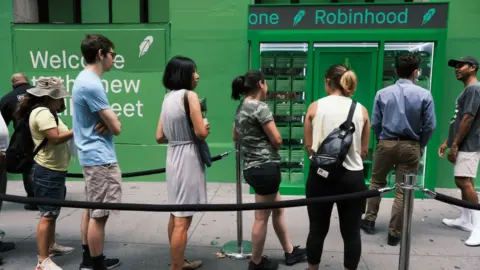Robinhood has a muted stock market debut
 Getty Images
Getty ImagesRobinhood, the online brokerage on a mission to "democratise finance for all", has had a humbling debut on the Nasdaq stock exchange.
More than 49m shares worth $1.8bn (£1.2bn) were sold in the first half an hour of trading, but shares in the platform then fell by up to 12% before regaining some ground.
Shares were first offered to the public markets at the bottom of its target range for buyers.
The opening price was $38 per share.
After the initial dip, it then climbed up to its current price of $36 - down around 5%.
Though it opened pricing shares near the low end of its range, the California-based company is worth $32bn - making it one of America's most valuable companies to have gone public this year.
However it didn't reach the $35m valuation it had hoped for.
Its stock market debut comes just months after it was caught in a confrontation between a new generation of retail investors and Wall Street hedge funds.
Unusually, the company put aside 20% to 35% of its shares for its customers in the public market debut on the New York Stock Exchange.
Its easy-to-use interface made it a hit among young investors trading from home during coronavirus-induced restrictions and its popularity has soared over the past 18 months
Users flocked to the platform during the pandemic, with the number of accounts doubling to 31 million since January.
"We didn't build Robin Hood for the rich or those with decades of experience. We built it for everyone. We're humbled to be serving over 22 million people. And yet there's so much more to do," chief executive Vlad Tenev said.
"The business has been a juggernaut. They've got a great platform they can build off of," said David Weild, former vice chairman of the Nasdaq and current chief executive of investment bank Weild & Co.
 Getty Images
Getty ImagesKathleen Smith, co-founder of bank Renaissance Capital said their success is because they've made it "exciting to trade on their app, and the other brokers are going to have to catch up".
"They already showed when they started that out, offering commission free trading, it didn't take too long for the rest of the competitors to follow suit - so they have been a leader in disrupting the space," she explained.
The business was launched in 2013 by friends Vlad Tenev and Baiju Bhatt at Stanford university, and has tried to appeal to young investors by not requiring account minimums or charging commissions. Its median customer age is 31.
Earlier this year, it was involved in the GameStop trading buzz, being one of the main platforms through which retail investors could trade.
Robinhood's revenue in the March quarter jumped fourfold, thanks to the trading mania in the so-called meme stocks. But it also came at a cost, putting it at the centre of several regulatory probes.
Mr Tenev said the situation the firm faced in January - when financial strains led it to limit certain stock purchases - was "unacceptable to us". Lawmakers later said the move, which sparked outrage, had raised questions about fairness in financial markets.
The trading frenzy saw the price of GameStop shares rise from less than $20 at the beginning of January to more than $350 in a matter of weeks.
Last month the business was fined $70m by a regulatory body that said it harmed thousands of consumers through "false and misleading" communications.
In 2020, the company also paid $65 million to America's Securities and Exchange Commission for misleading customers.
